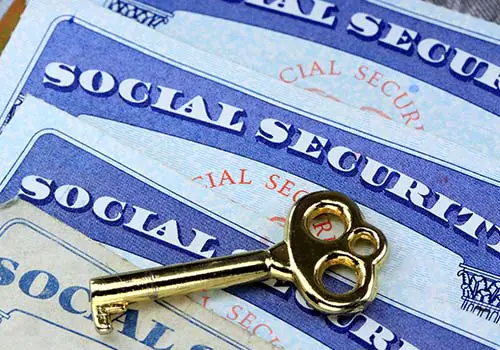With the prices of almost everything rising, many people wonder how they can get more out of their Social Security benefits. Living on Social Security can be challenging, so you must get the most out of your retirement benefits as possible.
So, what can you do to maximize those benefits and ensure you get the highest monthly payments? You can potentially increase your benefit amount by several things, and we will discuss several specific items in this article. Keep reading to learn more!
Social Security Benefits Overview
Before maximizing your benefits, you need to understand how Social Security works.
Pre-retirement
At a high level, the concept is relatively simple. While working, you pay into the Social Security system through payroll taxes. This income and Medicare tax are collected and placed into the Social Security trust funds. The money in the trust funds is invested in U.S. government securities, and it is used to pay benefits to current retirees and those on Social Security disability.
Post-retirement
Once you reach full retirement age, you begin to reap the rewards of paying into the system during your working years. You can then start to receive retirement benefits from the Social Security Administration (SSA). You receive the amount based on your wages during your working years. So, your Social Security income directly relates to how much money you paid into the system.
The average Social Security payment in the United States is about $1,927 monthly, while the maximum payment is around $4,873. Not only can you receive benefits based on your own earnings history, but you can also receive spousal benefits from your spouse’s work history or survivor benefits, which are available to a surviving spouse when one spouse passes away.
KEY TAKEAWAYS
- Your journey to Social Security benefits begins with regular contributions to the program; once you meet the credit requirement and reach retirement age, you can receive benefits.
- A few tips for maximizing your Social Security benefits are working at least 35 years, delaying the start of benefits, and watching out for taxes.
8 Tips To Increasing Your Benefit Amount
Many ask, “How do I maximize my Social Security benefits?” Now that you know how the system works, let’s dive into specific actions you can take to make the most of your benefits. You might not be eligible to perform all these, but you should explore whether they will work for you. You are almost sure to find a few that will help you get a bigger Social Security check.
1) Delay Starting Your Benefits
This is one of the biggest tips out there. If possible, you should delay starting your benefits as long as possible. While we know it is not financially feasible for everyone, you should do everything possible to wait until full retirement age or later to start your benefits. Getting your benefits early can sometimes reduce your benefit amount by 25% or more. That is a significant cut!
You can even use a Social Security breakeven calculator to see how your benefits would be affected by starting early. However, waiting until age 70 to begin your benefits will increase the amount you usually receive. If you can make it to age 70 without Social Security, then waiting until then to start your benefits will help give you the largest check possible.
2) Work At Least 35 Years
Your Social Security benefit amount is calculated using your highest 35 years’ worth of indexed wages. If you have not worked for at least 35 years, the Social Security Administration still uses 35 years’ worth of data to calculate. That means that they will add zeros as your income for those years.
For instance, if you have only worked for 25 years, your calculation will include a zero for 10 years of your work history. This can substantially affect your final benefit amount, so you should ensure that you have at least 35 years’ worth of earnings on your record before you start receiving your benefits.
3) Max Out Your Indexed Wages
This one might seem obvious, but you will want your indexed wages to be as high as possible. When working at a company and earning a regular paycheck, there is not much that you need to do. However, for self-employment income or tip income for those in the service industry, this should stress the importance of ensuring you report tips and claim all your income.
Many people might forget to claim cash tips and only report tips left on a credit card or debit card. While putting a little aside without reporting it might be tempting, that is not a good idea. Not only could you get in trouble with the IRS now, but doing this will also lead to a lower earnings history and lower Social Security payments in retirement.
4) Claim Spousal Benefits First
If you have a spouse entitled to benefits, you might get the best of both worlds. When you both reach full retirement age, you could claim spousal benefits and start drawing those benefits based on your spouse’s earnings record. However, your benefit amount will continue to grow.
Once you reach age 70, then your benefit will be maxed out. At that time, you can switch from spousal benefits to your benefit, which will be as high as possible. Remember this one catch, though. For this to work, you must start the spousal benefits before applying for your benefits. If you have already begun receiving benefits, this tip will not work since you cannot use this unique restricted application.
5) Watch Out For Taxes
Believe it or not, Social Security benefits are taxable in some situations. Whether or not your benefits are taxable depends on your total taxable income and adjusted gross income for the year. Up to 85% of your benefits could be subject to income tax if your income exceeds the threshold.
You should remember this if you plan to work after you start your benefits or receive income from a retirement account like an IRA or 401k. There are ways to spread out your income from these accounts to minimize the amount of tax due. You should always consult a qualified financial planner or tax advisor to assist you with these strategies.
6) Be Aware Of Earned Income Limit
This applies to people still working and starting their benefits before reaching full retirement age (FRA). In that case, there is an earned income limit for those benefit recipients. Your benefits might be reduced if you earn too much money before FRA.
In 2024, earning more than $1,860 monthly will reduce your benefits if you are under age 67. This means that for every $2 you earn above the limit, your monthly benefit amount will be reduced by $1. That can add up to a significant reduction if you are still working. Note: Your benefit amount will be recalculated when you reach the full retirement age.
7) Keep An Eye On Earnings Record
Another way to ensure you get the maximum possible amount back from your Social Security taxes is to monitor your Social Security earnings record. It is easy to access your information through a MySocialSecurity account. You will want to make sure that your record with your “My SSA Account” matches the amount claimed on your federal income tax return each year.
Another way to check your earnings is to match the amounts with your Form W-2 each year unless you are self-employed. You can also use your account to access benefit estimates, although be sure to read the disclosures on these estimates regarding estimated future income and benefits.
8) Remember Your Ex-Spouse
Many people want to forget their ex-spouse, but that might not be a great idea regarding Social Security. In some cases, you might be able to claim benefits from their earnings record. You could still potentially claim benefits based on your ex’s earnings if you have been married for over 10 years and have not remarried.
You will need to be at least 62, and your benefits based on your earnings record must be lower than those you would receive by claiming your ex-spouse’s record. However, this can be used as a last resort and sometimes gets you a higher retirement income.
Must read articles related to Social Security
- What is a Social Security Award Letter, and how do you get a copy?
- Complete guide to the ins and outs of Social Security.
- Do I have to pay taxes on my Social Security income?
- Are there states that don’t tax Social Security income?
- Will working while receiving Social Security reduce my benefits?
TIP
Social Security was not designed to be the sole source of income for retirees. Investing in private retirement plans like IRAs and 401ks provides additional retirement income and flexibility.
Other Retirement Planning Considerations
As you can see, living on Social Security alone could be pretty tricky. This is why it is imperative to consider other alternatives when saving for retirement. You should not rely on Social Security, and you should start your own retirement savings accounts as well. This could be in the form of an IRA, 401k, or some other type of account. The important thing is to start saving early and save as much as possible.
Consult a Financial Advisor
Retirement distributions and tax rules can be complicated when combined with Social Security benefits. You should always consult a financial advisor to help with your personal finances. They can advise you on the rules whether you are single or a married couple, as the rules for each are slightly different.
The biggest takeaway is to ensure you are planning for retirement appropriately. Simply thinking that the Social Security taxes you pay today will support you during retirement is not a good plan.
The Bottom Line
You might think your Social Security benefit is set in stone no matter what you do. That is not the case! There are some simple steps that you can take to maximize Social Security benefits, and those steps are not complicated.
Maximizing your benefit amount is more important than ever with the current inflation rate and cost of goods. Take action today by following these steps to maximize your Social Security benefits.
Frequently Asked Questions
Most people consider the Social Security tipping point to be the year 2035. This is when projections show that the system will no longer have enough money to fund its obligations fully. At that time, only about 78% of benefits could be paid from the funding that Social Security would receive.
Whether Social Security benefits are taxable depends on your total adjusted gross income. If you are single and make between $25,000 and $34,000 annually, you will pay taxes on 50% of your benefits. If you make more than $34,000, then 85% of your benefits will be taxable. For married couples, the rules are similar; however, the amounts are different. For combined incomes, the limits increase to $32,000 and $44,000, respectively.
Social Security will likely continue for many years. However, some changes will be required within the next ten years or so. According to the latest trustees report, Social Security is only fully funded through 2035.
Changes will be required in the future to keep the system operating. These could include reducing benefit amounts, raising the retirement age, increasing taxes, or a combination of those things. No one knows what the changes will look like, but Social Security is not likely to disappear anytime soon.
You can find a Social Security Administration office near you by using our SSA office locator and searching for your closest location.






